My Weekend with Emmanuel - Day 1
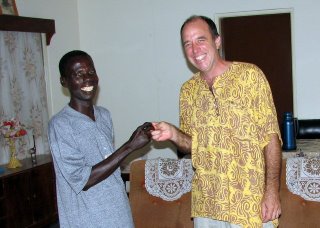
[Kofi (Emmanuel's Uncle) & Steve practicing a snap-handshake]
This is a trip Emmanuel and I have been planning for several months, and as the day neared I must admit I felt some anxiety about giving myself over to another culture. I think I was more brave before I “ate something” and got so sick the last time, and so there is great fear that it might happen again. Emmanuel has gone to great lengths to make sure that it does not happen, bringing Vida to cook for us, enough water to last the week-end, and staying in a guest house.
Because Emmanuel is our day guard, he had to ask for some time off. If the security company found out that we went away together, he could be transferred to another house, as they do not like the client and guards to become close. So we had to dash his supervisor, and a relief guard so that we could leave early. Turns out we had to dash that relief a second time as his supervisor had kept all of the dash he was to split.
We left Accra about two hours later than we had planned and hit the massive traffic jams that are a fact of daily life for those leaving Accra. There are two routes out of town going west that connect to the same highway. One route is shorter, the other longer. The short one is a two lane undivided road (that splits into four and is choked with TroTros) and the longer route, is a three lane divided highway (and also choked with TroTros). We take the former, the one route I told him I did not want to take. “I show you shortcut,” he says, and I’m all for that since this route is always a mess. I don’t know what it is about Emmanuel, but when I tell him that I do not want to take a certain route or go to this certain place, it turns out to be exactly where we go. So now we’re caught up in this dangerous, highly fluid congestion of traffic and I ask, “So when I told you the Tema Highway Extension was the one place that I did not want to go to, you took me here, why?” He does not answer and seems genuinely surprised the traffic is this bad.
This is a cross-cultural weekend, and so I know there will be other issues, like the African way of handeling money. I’ve noticed this before, that when we’re at the market, Emmanuel likes to negotiate the price in the local language, and then tell me the final price in English. He takes my money to pay for it, counts it and hands it to the seller. If there is change, Emmanuel pockets it. I didn’t notice this in the early days, and thought maybe I was giving Emmanuel the money to count, to make sure it was the right amount. Now we’re on the road picking up last minute things from the hawkers that show up when the traffic flow slows. Things like bread. When you come from Accra, the tradition is, you bring a loaf of bread. There is actually a town that specializes in bread, the once we’ve called “market town” in other entries, that the one obrunies here have nicknamed Bethlehem, because of the bread venders. Lots of venders selling bread. Bethlehem means “House of Bread,” and so Vida and Emmanuel are picking out different loaves here and there and it seems like the price is always $15,000, and all I have is ¢20,000 notes. The ¢5,000 note change never quite seems to make it back to me.
Its dark now, and we have been on the road for 4 hours, and we’re nearing Cape Coast. It is time to stop for dinner, and I’m getting tired. I do the calculations in my head 90 minutes for dinner, and still two more hours drive, and we’re talking midnight before we get to the guest house. Too late for me. I propose we spend the night in Cape Coast because as it gets later, the TroTros get crazier, and it is already unsafe. We pull over to a travelers gas station and in we go to buy more bread and ground-nuts (peanuts). I’m thinking this is a snack dinner, which is great, we’ll be on the road that much quicker (turns out we were actually buying breakfast). This time when the change comes, I grab for it. There is a bit of a struggle, and he makes up some excuse about wanting to dash the store clerk, and I say no, which is funny since he is always telling me to not dash people. Like earlier when we stopped to fill up the gas tank and the bill comes to ¢605,000, and just like always he takes the money, counts it, and as he is walking away I say, “dash the attendants ¢5,000” and he says “Nope!” Later I ask the attendances, “Did he dash you?” They say no, and I’m pulling out money to dash them, and he walks up. “Why did you not dash them like I asked?” He says “We do not dash attendants,” well I do, and the guy who lent us this car, asked that we do.
Now Emmanuel was an filling station attendant many years ago and so I ask him if people ever dashed him, “yes” he says, and did you not like it when people dashed you? “Yes” and so why did you not dash them, and he has this story about how they had tried to cheat me, and I’m thinking, but you pocketed their dash, and so who is cheating whom? Later I will kick myself for not just going more with the flow of things. Actually, I think I am going with the flow pretty well, especially since there is a steady flow of money out of my pocket. Obrunie ATM.
They say that one of the differences between the Western World and Africa is how westerners will let money ruin friendships. The joke in the West is if you want to lose a friend, just loan them money. That would never happen here. Money is treated like a community resource, maybe like water from a well. A neighbor asks for some water, and of course you would share, so it is when friends/family/neighbors ask for money, if you have any, it is theirs for the asking. I’m trying not to be annoyed at his sticky fingers, and figure I’ve brought three months of his salary for the week-end, and so we should be able to make it last.
After wrestling over the change, we come out of the travelers store, it was an actual nice store, up to 7-11 standards, clean, well lit, and air conditioned. Outside side we find Vida has commandeered a table from an outside bar, and found chairs to put around it. The table is set and she has brought a tackle box full of Jollif Rice, and she serves us.
In the early planning stages of this trip it was to be Emmanuel and I on a week-end adventure, and then he decided to bring Vida along, to cook the food, so I would not get sick. Since Vida is coming, so do his girls, Anna (8) and Ruth, who just turned 5. When we pick the family up, Cary, Vida’s little brother along too. Cary has been mooching off them for the past few months, and I gather is in the doghouse with Emmanuel, something about loaning him cedis he was saving for his girl’s school fees, and now that loan has turned into a dash. I rarely hear Cary speak and never in the presence of Emmanuel, he is more of a quiet shadow the whole week-end, who washes the car every morning before I wake up. So its all six of us around the table eating Jollif Rice.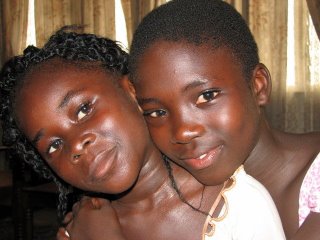
[Ruth & Anna]
The Jollif Rice was great, the setting, a little surrealistic. We’re sitting under the African sky, eating African food and Elton John is blasting out of the bar’s speakers. “Good bye Norma Jeanne, though I never knew you at all..”, It’s his tribute to Marilyn Monroe, the one that so mournfully calls her a candle in the wind, that burned out too young. At 9pm we’re back in the car heading down even darker unknown roads, and I notice something about time that won’t be obvious for another few days. 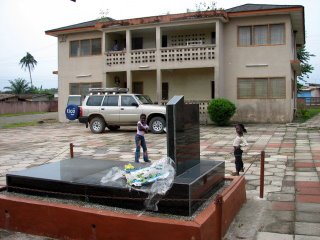
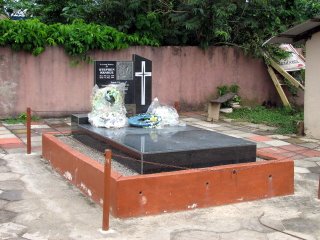
[The backyard grave of Stephen Krakue]
By 10:45 pm we have arrived at the “Guest House,” in the town of Mproho (pronounced m-po-ho). The guest house is a two story building former home of one of Mpoho’s favorite sons, Stephen Krakue who died two years ago and is buried in the back yard. 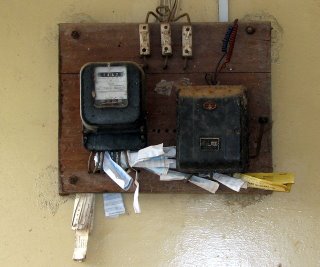
[Unpaid bills on the electric meter]
Now his elder brother operates it as a guest house, but how long that will continue seems uncertain. There is some trouble paying the utilities, and the water has already been cut off and looking at the electric panel, the light seems to be next.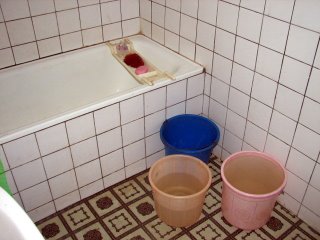 [bucket showers]
[bucket showers]
Hello bucket showers. Since there is no water in the building (or as they say, “the pipe is not flowing”), water has to be brought upstairs in buckets from the community water tap across the courtyard. Emmanuel had warned me about this, they had asked “Will obrunie bathe in bucket?” except when he asks it sounds like he is saying barf instead of bathe. “Will obrunie barf in bucket?” and I’m thinking, I hope not, but he is talking about bathing, and I assure him it would be OK.
I have to laugh, because when we get there, there are three buckets. One of the “Steveisms” I talked about with staff was the theory of the three buckets, and here they were.
The Three Buckets
In life there are three buckets: faith, friendship/family and work/calling. Each bucket needs a place to get refilled, the faith bucket at worship; the friendship bucket, with friends and family; and the work (or meaning) bucket as we follow our calling. The problem comes when we start combining buckets, say our complete set of close friends come from work, but then something happens and we get fired. What about those friends and how awkward is that going to be the next time we see them? In this example the work and friendship buckets were combined and when the work bucket went bad, the friends bucket was spoiled too. Combining two buckets is dangerous, combining three is lethal, and therein is the problem with work in the church. Too often, we church workers combine our three buckets, we work at the church, our friends are at the church, and our faith gets fed in church. But what happens when an unpopular decision is made, one that our friends don’t agree with, and they take it out on us?
At first the three-in-one buckets felt great because all three buckets were always full, friendship, faith and work. But then something happened, or to put it another way, someone pooped in the bucket, and now it stinks. It stinks to work at the church, and our friends are angry with us, and the one place we fed our faith, also stinks. Someone pooped in the bucket, and the there buckets were not distinct, they all stink.
Its not a matter of if poop will appear in one of the buckets, but when, and when it does, wouldn’t it be great if at least one of them didn’t get some stink in it? In those times, its only the non-stinky bucket that provides the support we pastors and church staff need to get us through the current poop producing crisis. But working in the church it is hard to keep the buckets distinct, therein lies the problem.
Fortunately, there is a toilet in this guest house, so nobody has to poop in the buckets, but we do have to empty them into the toilet to flush it, so we do wait until it is brown to flush it down.
[picture of my room]
My room is nice, and large by Ghanaian standards. It has a great overhead fan, lots of air flow and a comfortable bed. I sleep alone in my room, and everyone else sleeps in the other room down the hall We all sleep well, until 5am (OK – so the roosters started at 4am, but you get used to that in Ghana). At 5am, its time for Community Radio. Community Radio is a loudspeaker system that blasts from atop of a tall pink building, the tallest in town. The broadcast, if you can call it that, is a man shouting announcements for 45 minutes in Twi or Fante. That first morning, in a sort of half awake state I thought it was the imam at the local mosque calling the faithful to morning prayers. I thought he was praying for me. Late in the afternoon Emmanuel translates one of the announcements when they are being repeated. “Chainsaw operators are required to attend a meeting tonight at 7pm...” The last morning we are there, I hear the guy singing Happy Birthday, but this morning, our first, it has brought me to full awakeness, and I’m ready to begin the adventure.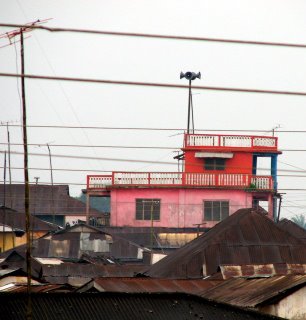
[This is the Community Radio broadcast tower] [the 4am Rooster, I'd prefer to change his name to "stew"]
[the 4am Rooster, I'd prefer to change his name to "stew"]
Labels: african money, Ghana, rural village

0 Comments:
Post a Comment
<< Home